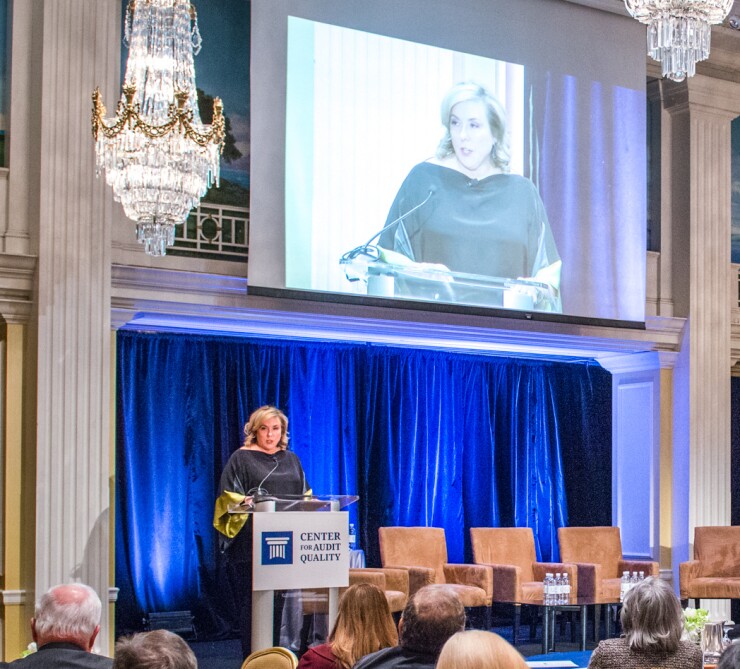The audit of the future is about whiz-bang tech. Artificial intelligence, advanced data analytics, blockchain, drones: It’s all coming at CPAs and the public company auditing profession — fast. As Eric Hansen, chief operation officer of Top 100 Firm BKD and chair of the American Institute of CPAs, has said: “The amount and pace of change facing our profession is at an all-time high.”
Yet the flash of tech shouldn’t cause us to lose sight of the fact that the audit of the future is also about people. Take it from Gilly Lord, head of audit strategy and transformation at PwC UK. “The audit of the future is going to become a very exciting collaboration between humans and machines,” she has predicted. “By putting them together we’ll be able to do much better-quality audits.”
This will indeed be an exciting collaboration, and it won’t just involve auditors. Other groups of people will be crucial to shaping the audit of the future, as will dialogue with those groups.
One key constituency is academics, who are every bit as much on the front lines of change as practitioners. Earlier this year, I had the opportunity to discuss how the academy is adjusting to innovation in auditing with an outstanding panel at the 2018 Deloitte/University of Kansas Auditing Symposium.

A participant on my panel was Scott Showalter, director of the master of accounting program and professor of practice at North Carolina State University’s Poole College of Management. Professor Showalter put a strong emphasis on the importance of integrating data analytics into curricula. In fact, he said that given the importance of data, Poole’s administrators opted against creating a stand-alone major or minor in the subject. Instead, they worked to weave hours of data analytics requirements throughout the core curriculum.
Yet while data analytics and other tech topics become increasingly important on campuses, the fundamentals will also remain key to the audit of the future. Also on my panel at the University of Kansas was Dave Sullivan, who is the national managing partner of the quality and professional practice of Deloitte & Touche. Although he works daily with cutting-edge technology, Dave offered his view that, “Technology isn’t as important as getting somebody to love learning.” The auditor of the future, he said, must be a critical thinker, someone inquisitive and unafraid to ask questions such as, “Why is that good enough?”
Another fundamental for academics is maintaining and teaching the ability to adapt to changing technology. For his part, Professor Showalter revealed that he and colleagues don’t “over-agonize about the tools,” which change constantly. “Whatever you do, in two years you’re going to totally change,” he said.
Given this relentless and accelerating evolution, ongoing dialogue between academics and practitioners is more important than ever. Dialogue is also essential with another group of people on whom the audit of the future depends: students. From grade school to graduate school, we need to tell the story of auditing to younger people, building their awareness of the profession’s dynamism and opportunity. We need to spark their enthusiasm and to enhance their understanding of the mindsets, skills and behaviors that will enable them to grasp those opportunities.
This awareness-building has been ongoing for many years, notably through two outstanding AICPA initiatives: “This Way to CPA” and “Start Here Go Places.”
A more recent channel for communication is the annual #AuditorProud social media blitz, which since its launch in 2015 has reached millions of people around the globe. This year’s blitz will take place on Sept. 27, and I urge anyone reading this column to join the festivities. Share your positive stories about your experience with the auditing profession on Twitter, Facebook, Instagram or LinkedIn. You can learn more about the blitz at
This article is part of an ongoing series exploring the evolving landscape of the audit and the auditing profession. Other installments include:
- "
The enduring importance of professional skepticism ," by Sara Lord of RSM US - "
Where is the audit profession going? " by Mervyn King of the IIRC





